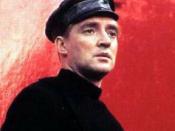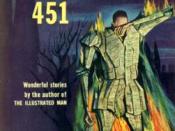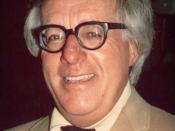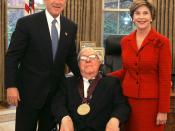Fahrenheit 451, is a science fiction novel that written and published by Ray Bradbury in 1953. The concept for the novel began with the 1947 as a short story "Bright Phoenix" that was latter published in the Magazine of Fantasy and Science Fiction in 1963. A movie version of the novel was released in 1966, and a second version is said to begin filming in 2008 (Gioia). The novel shows a future American society in which the people have "dumb themselves down", to the point where education and reading mean nothing. The number "451" refers to the Fahrenheit temperature at which a book or paper ignites and burns. Bradbury has stated that the novel is not about "dumbing down" society; he states that Fahrenheit 451 is a story about how television destroys people's interest in reading. Bradbury has also stated that most of his novel was written in UCLA's Powell library on a pay typewriter.
In the future anti intellectual Americas have completely abandoned self control, and filled the streets with lawlessness. From teenagers crashing their cars into people, to firemen who set their mechanical hound to hunt various animals for the simple pleasure of watching them die. In this society anyone caught reading a book is, at the minimum, confined to a mental hospital while the books are burned. Illegal books mainly include famous works of literature, such as Whitman and Faulkner, as well as The Bible, and all historical texts. One night returning from his job, the main character Guy Montag meets his new neighbor Clarisse McClellan, whose ideals and liberating spirit force him to question his life, his ideals, and his own happiness and love. Later in the book it is said that Clarisse had been killed in a car accident. After meeting Clarisse, he returns home to find his wife Mildred asleep, with an empty bottle of sleeping pills next to her bed. He calls for medical help, and two technicians come and proceed to suck out Mildred's blood and insert new blood into her. The technicians disregard for Mildred forces Montag to question the state of the society. In the following days, while guy was working as a fireman whose job is to burn books, takes one after he accidentally reads a line form a book: "Time has fallen asleep in the afternoon sunshine" (Bradbury). This makes him steal one of the books. Montag calls in sick, and his fire chief Captain Beatty comes and explains to him the political and social reason for their job. Beatty adds that all firemen steal a book out of curiosity, and that all would be well if the book is turned in within 24 hours. Soon Montag has hidden dozens of books in the ventilation shafts of his own house and needs someone to help him memorize them. He remembers a man he had met at one time: Faber, a former English professor. Faber begins teaching Montag that the overall importance of literature in its attempt to explain human existence. Faber also gives Montag a green bullet-shaped ear-piece so he can offer guidance throughout guy's day. Latter reveals that he knew all along of Montag's books, and orders Montag to destroy the house. Mildred, who had betrayed his secret, ran away from the house as Montag burns televisions, beds and other possessions of his past life. When Beatty finds Faber's earpiece, he threatens to track Faber down. Montag turns the flamethrower on Beatty, killing him. He flees to Faber's house, with a mechanical hound and television network helicopters in pursuit. The newscasters hope to document his escape as a spectacle, and distract the people from the threat of war. Faber tells Montag of vagabond book lovers in the countryside and Montag escapes, to a local river, floats downstream and meets a group of older men who, to Montag's astonishment, have memorized entire books, preserving them orally until books are allowed again. The group leader, Granger, discusses the phoenix and its cycle of life, death in flames, and rebirth. Meaning the phoenix has some relation to humankind, constantly going back to its cycle of making mistakes, and not learning from the past. He comments that man can learn, unlike the doomed phoenix. Meanwhile, the television audience thinks that Montag has died, but he is actually safe. Then war begins and Montag watches as jet bombers fly over the city and drop nuclear weapons. Faber is assumed to have left the city, but more cities across the country have been bombed as well.
Guy Montag is the fireman whose job is to burn illegal books. Throughout the book it seems as if he struggles with the idea of burning things; it is almost as if he gets pleasure from burning things, and in fact the book begins with him saying "It was a pleasure to burn" (Bradbury). At first he is a loyal member of his society until he meets Clarisse who gives him what he had been missing. This sparks something in him that starts him to explore what is wrong with society by reading books. Montag seems to be stuck between trying to be happy and finding intellectFaber is a former English professor, who represents those who know what is being done is wrong but are too fearful to act.
Mildred Montag is Guy's wife, who tries to hide her own emptiness and fear of questioning her surroundings or herself with meaningless chatter and with her television family. She constantly tries to reach the state of happiness, but is inwardly miserable. Mildred even tries to commit suicide by overdosing on sleeping pills. I think she is used symbolically as the opposite of Clarisse McClellan.
Clarisse McClellan displays every trait Mildred does not. She is outgoing, naturally cheerful and intuitive. She serves as the wake-up call for Guy Montag by posing the question "are you happy?" (Bradbury) to him. She is unpopular among peers and disliked by teachers for asking why instead of how and focusing on nature rather than technology. Montag always regards her as odd until she goes missing. It is said that Captain Beatty and Mildred know that Clarisse has been killed by a car (Johntson).
Captain Beatty is Montag's boss and the fire chief. Once a reader, he came to hate books due to life's tragedies. He is disgusted with the idea of books and the fact that they all contradict each other. In a scene written years later by Bradbury for the Fahrenheit 451 play, he invites Guy to his house where he shows him walls of books which he leaves to molder on their shelves. He tries to make Guy go back into the book burning business (Johntson). Guy later realizes that Beatty might have wanted to die, provoking Montag to kill him. I think he is the symbolic opposite of Granger.
Granger is the leader of a group of wandering intellectual. Exiles who memorize books so they will be saved. Where Beatty destroys, he preserves; where Beatty uses fire for the purpose of burning, he uses it for the purpose of warming. His acceptance of Montag is considered the final step in Montag's change from embracing Beatty's ultimate value, happiness and complacency, to embracing his value of love of knowledge (Johntson).
âÂÂWork CitedBradbury, Ray. Fahrenheit 451. New York: Random House Publishing Group, 1991.
bradburyfan@msn.com. fahrenheit 451. 18 October 2006. 29 July 2008 .
Gioia, Dana. Fahrenheit 451. 2006. 27 July 2008 .
Johntson, Amy E. Boyle. Ray Bradbury: Fahrenheit 451 Misinterpreted. 30 May 2007. 27 July 2008 .
Kingsley, Amis. Darabont stokes flames for '451'. 1 Feduary 2001. 30 July 2008 .
Weller, Sam. About Ray Bradbury. 3 June 2006. 27 July 2008 .





